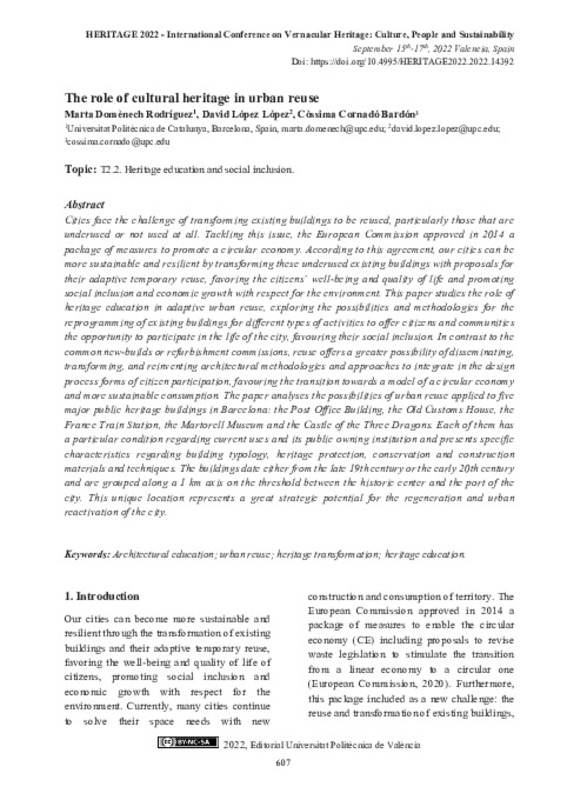JavaScript is disabled for your browser. Some features of this site may not work without it.
Buscar en RiuNet
Listar
Mi cuenta
Estadísticas
Ayuda RiuNet
Admin. UPV
The role of cultural heritage in urban reuse
Mostrar el registro sencillo del ítem
Ficheros en el ítem
| dc.contributor.author | Domenech Rodríguez, Marta
|
es_ES |
| dc.contributor.author | López López, David
|
es_ES |
| dc.contributor.author | Cornadó Bardón, Còssima
|
es_ES |
| dc.date.accessioned | 2022-10-27T11:26:55Z | |
| dc.date.available | 2022-10-27T11:26:55Z | |
| dc.date.issued | 2022-09-13 | |
| dc.identifier.isbn | 9788413960203 | |
| dc.identifier.uri | http://hdl.handle.net/10251/188836 | |
| dc.description.abstract | [EN] Cities face the challenge of transforming existing buildings to be reused, particularly those that are underused or not used at all. Tackling this issue, the European Commission approved in 2014 a package of measures to promote a circular economy. According to this agreement, our cities can be more sustainable and resilient by transforming these underused existing buildings with proposals for their adaptive temporary reuse, favoring the citizens’ well-being and quality of life and promoting social inclusion and economic growth with respect for the environment. This paper studies the role of heritage education in adaptive urban reuse, exploring the possibilities and methodologies for the reprogramming of existing buildings for different types of activities to offer citizens and communities the opportunity to participate in the life of the city, favouring their social inclusion. In contrast to the common new-builds or refurbishment commissions, reuse offers a greater possibility of disseminating, transforming and reinventing architectural methodologies and approaches to integrate in the design process forms of citizen participation, favouring the transition towards a model of a circular economy and more sustainable consumption. The paper analyses the possibilities of urban reuse applied to five major public heritage buildings in Barcelona: the Post Office Building, the Old Customs House, the France Train Station, the Martorell Museum and the Castle of the Three Dragons. Each of them has a particular condition regarding current uses and its public owning institution and presents specific characteristics regarding building typology, heritage protection, conservation and construction materials and techniques. The buildings date either from the late 19th century or the early 20th century and are grouped along a 1 km axis on the threshold between the historic center and the port of the city. This unique location represents a great strategic potential for the regeneration and urban reactivation of the city. | es_ES |
| dc.description.sponsorship | This work is part of the project Co-inhabiting Barcelona - five case studies in Ciutat Vella for urban reuse and the promotion of innovative production models, supported by the City Council of Barcelona and Barcelona Science Plan and granted at the call “Scientific Research Awards for Urban Challenges in the City of Barcelona 2020”. | es_ES |
| dc.format.extent | 8 | es_ES |
| dc.language | Inglés | es_ES |
| dc.publisher | Editorial Universitat Politècnica de València | es_ES |
| dc.relation.ispartof | Proceedings HERITAGE 2022 - International Conference on Vernacular Heritage: Culture, People and Sustainability | |
| dc.rights | Reconocimiento - No comercial - Compartir igual (by-nc-sa) | es_ES |
| dc.subject | Architectural education | es_ES |
| dc.subject | Urban reuse | es_ES |
| dc.subject | Heritage transformation | es_ES |
| dc.subject | Architecture | es_ES |
| dc.subject | Heritage education | es_ES |
| dc.title | The role of cultural heritage in urban reuse | es_ES |
| dc.type | Capítulo de libro | es_ES |
| dc.type | Comunicación en congreso | es_ES |
| dc.identifier.doi | 10.4995/HERITAGE2022.2022.14392 | |
| dc.rights.accessRights | Abierto | es_ES |
| dc.description.bibliographicCitation | Domenech Rodríguez, M.; López López, D.; Cornadó Bardón, C. (2022). The role of cultural heritage in urban reuse. En Proceedings HERITAGE 2022 - International Conference on Vernacular Heritage: Culture, People and Sustainability. Editorial Universitat Politècnica de València. 607-614. https://doi.org/10.4995/HERITAGE2022.2022.14392 | es_ES |
| dc.description.accrualMethod | OCS | es_ES |
| dc.relation.conferencename | HERITAGE2022 International Conference on Vernacular Heritage: Culture, People and Sustainability | es_ES |
| dc.relation.conferencedate | Septiembre 15-17, 2022 | es_ES |
| dc.relation.conferenceplace | Valencia, España | es_ES |
| dc.relation.publisherversion | http://ocs.editorial.upv.es/index.php/HERITAGE/HERITAGE2022/paper/view/14392 | es_ES |
| dc.description.upvformatpinicio | 607 | es_ES |
| dc.description.upvformatpfin | 614 | es_ES |
| dc.type.version | info:eu-repo/semantics/publishedVersion | es_ES |
| dc.relation.pasarela | OCS\14392 | es_ES |
| dc.contributor.funder | Ajuntament de Barcelona | es_ES |








